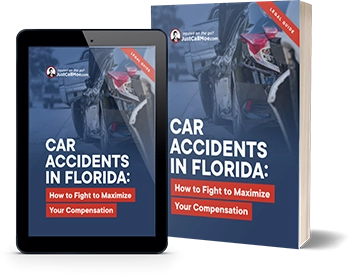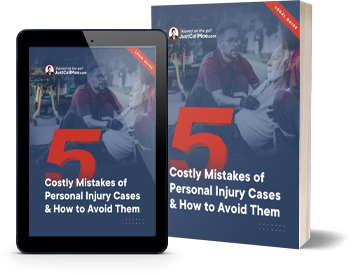Florida is currently the only state in the nation that does not require bodily injury coverage. This means that in many cases for victims of car accidents in Florida, the policy limits available may be insufficient to cover the injury the at-fault party caused to you. While Florida mandates all drivers have a personal injury policy, commonly known as no-fault coverage, this only covers up to $10,000 in medical expenses.
How Florida Auto Insurance Limits Work
Florida is a no-fault state, but this does not mean that we do not hold people accountable for injuring others on the roadways. This simply means that all drivers in Florida must have no fault coverage on their insurance policy. No fault coverage or PIP coverage covers up to $10,000 in medical expenses if you are in an auto accident. You can use this coverage whether you are at fault for the accident or not.
Florida also requires drivers to maintain a minimum of $10,000 in property damage coverage to cover the costs of damage to a vehicle or other property. Unfortunately, bodily injury liability cover (BIL) is not mandatory in Florida, however, many drivers do elect to maintain bodily injury coverage. Bodily injury covers is only mandatory for drivers who have caused accidents before in some cases or those charged with a DUI or other traffic offenses.
As a driver in Florida, it is always a good idea to have bodily injury coverage on your policy. This helps to prevent future lawsuits and judgments against you. You can actually have your license suspended if you are unable to pay these judgments.
While PIP or no fault policy may cover up to $10,000 in medical expenses, this coverage is usually insufficient to cover all of your medical bills. Even one trip to the emergency room can exceed $10,000. Not to mention, the lost wages, pain and suffering, and future medical expenses you may incur. This is why it is imperative to have uninsured motorist coverage on your policy. This is the most important coverage you can purchase in our opinion.
Uninsured/Underinsured Coverage
We highly recommend purchasing uninsured/underinsured motorist coverage. This coverage steps into the shoes of the at fault driver if someone hits you and hurt you, but doesn’t have sufficient coverage to cover the damages caused. The policy covers personal injuries you or your loved one incur in an accident where the driver at fault has no insurance or if their liability insurance is not enough. Unlike PIP, UM/UIM also covers bodily injury, sickness, pain & suffering, lost wages, and death.
Uninsured/underinsured coverage is not mandatory. However, the insurance company must offer motorists the option to purchase it. When purchasing insurance, you must sign a statement showing you chose decline purchasing uninsured motorist coverage. Unfortunately, many people sign this form not realizing what it is or how important this coverage is in Florida.
What Happens When Accident Damage Exceeds Car Insurance?
When the at-fault driver has insufficient coverage to cover the damage he or she caused, it can be difficult for the injured party to make a full recovery.
First, you need to ensure that your attorney has explored all possible coverage options. For example, if the at-fault driver was doing a task while on the job, the employer’s insurance policy may provide coverage, even if the driver was not in a company vehicle. There may also be umbrella policiey’s held by the driver or owner of the vehicle. It is important to ensure that your attorney explores and exhaust all potential policies.
Once you have sufficiently explored all policies available, you must look to see if there is any uninsured motorist coverage available. Just because you do not have uninsured motorist coverage on your policy doesn’t mean that there is no applicable coverage. For example, if you are a resident relative meaning that you are related to someone that you live with and he or she has uninsured motorist coverage, this coverage may apply to you.
Finally, one all potential coverages are exhausted, you need to evaluate the assets of the at-fault driver to see if there are sufficient assets to seek in a civil lawsuit against the driver. An experienced attorney evaluates the case to determine whether you can pursue this route based on the facts.
File a personal injury lawsuit
You can also sue the driver personally by filing a personal injury lawsuit. Here, you will have to prove the driver’s negligence before a court of law. If the jury agrees, the jury will render a verdict based on the facts of the case and the damage that was caused by the at-fault party. One the jury issues a verdict, you then need to collect on that judgment against the individual’s assets.
While filing a lawsuit against the driver may be the obvious choice, you may also be able to seek compensation from other third parties, if they are found to be liable by extension. For instance, may be able to file a lawsuit against the owner of the vehicle, the employer, a third party contractor or ride share company, or a governmental agency through a vicarious liability claim if the facts of your case allow for such a claim.
Contact a Florida Car Accident Attorney
Does your accident’s damage exceed your car insurance policy limits? Contact us today in Tampa, Orlando, West Palm Beach and the surrounding areas to let us fight to get the compensation you or your loved one deserves. Our experienced attorneys at JustCallMoe in Florida will evaluate your case, negotiate with the insurer on your behalf, and file a personal injury lawsuit, if needed.
Car Accident Case FAQs
Can I sue for pain and suffering for a car accident?
Yes, you can sue for pain and suffering in Florida once you meet certain thresholds. Typically, you will need to show that the accident resulted in a permanent injury, disability, significant disfigurement, or death. You should always consult with an experienced injury attorney to determine what compensation you may be entitled to as part of your injury claim.
How long do I have to file a personal injury lawsuit?
According to Florida Statutes Section 95.11, you have four years from the day of the accident to file a personal injury lawsuit. However, in certain types of accidents, you may have a shorten timeframe to file a claim. If you fail to file a claim in time, you may forever be barred from bringing the claim. This is why it is extraordinarily important that you consult with an injury attorney as soon as the accident occurs.
How long does an insurance company have to settle a claim in Florida?
There is technically no time frame for an insurance company to settle a claim. While the insurance company must act in good faith and respond in a reasonable amount of time, there are no strict timelines. Typically, if an insurance company is dragging their feet or refusing to respond timely, you will need to file a lawsuit.
If the insurance company is found to have acted in bad faith, the insurance company may be liable for a verdict amount in excess of the policy limits. Bad faith is a complicated area of the law and you should always consult with an attorney regarding these types of claims. Bottom line is that if the insurance company wont play fair, you need to file a lawsuit to hold them accountable.

 (866) 225-5663
(866) 225-5663



